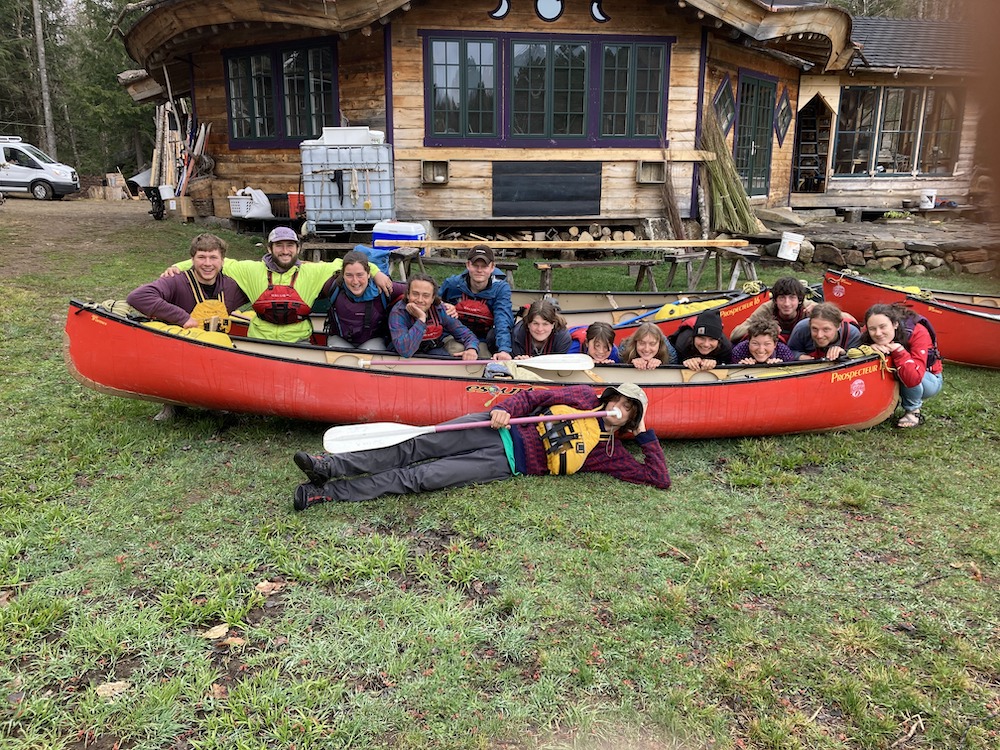
Ready to walk the canoes from Maine Local Living School to Mud Pond and begin the Spring Expedition
Spring leg was finally here, full of new challenges and opportunities waiting to greet us. Pack baskets were loaded, food boxes were packed, and paddles shone as we learned the first of many new skills: portaging! The canoes were carried down the steep hill from Maine Local Living School to Mud Pond, which we made our way across, some of us taking our first strokes as paddlers. (Walking the Canoes to Mud Pond)
We then carried the canoes on our shoulders to Drury Pond, where we met Temple Stream. Oh, how you taught us such humility! For such a small stream, Temple Stream had plenty of treacherous features: sharp bends, gravel bars, blockages, strainers, and even some small rapids. Thomas and Lily received the honor of the first flip when caught in a particularly nasty overhanging bush.
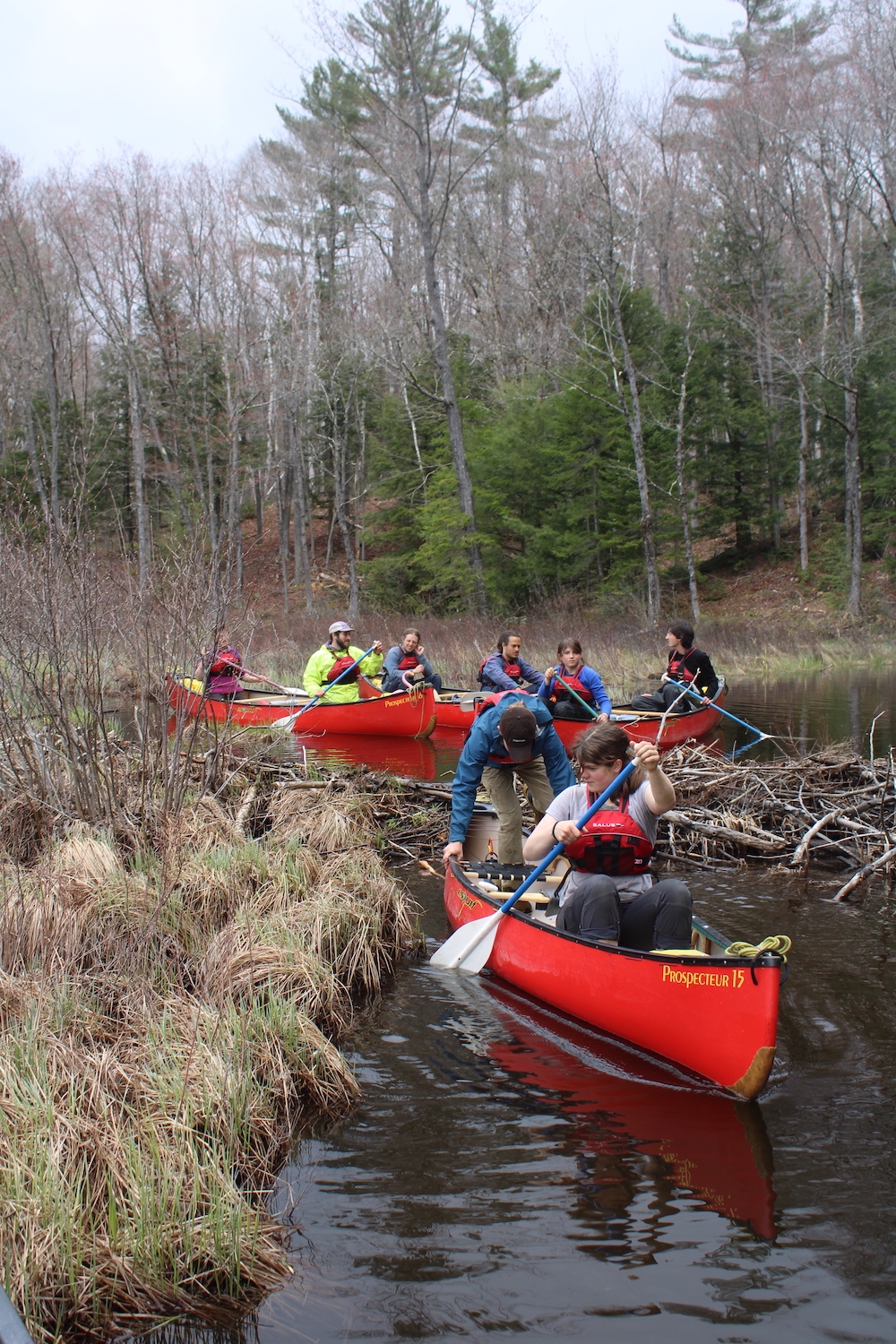
Learning to paddle, from Mud Pond to Temple Stream, over beaver dams…
The Temple Stream became progressively more and more rocky until finally we were forced to take out and portage along the road for almost a mile. We then made our way along a small beaver channel, half paddling, half walking along the bank, pulling our boats. We made it another couple miles before the sunset and we reached our destination, the yard of Jake, who graciously let us camp in his yard and even brought us some delicious ice cream. Certainly a night to remember.
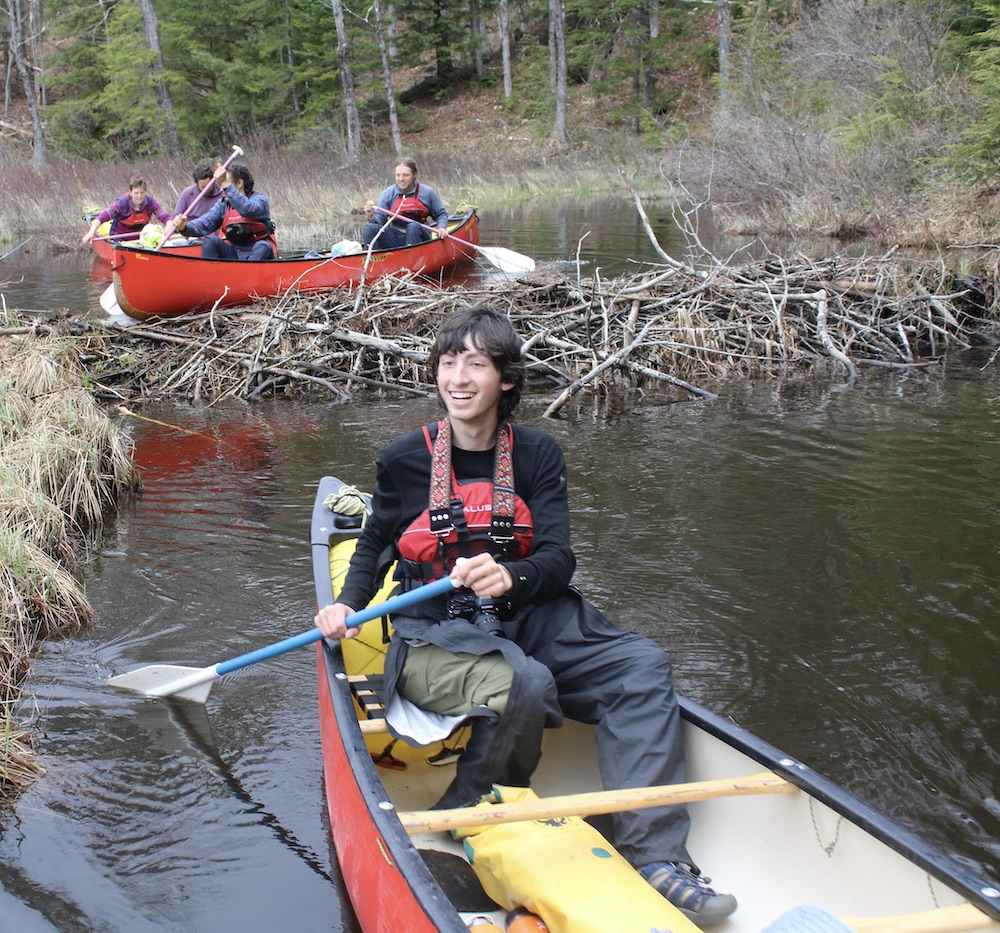
Russell (with his film camera) successfully past the first of many dams
We slowly learned the ins and outs of paddling as we continued along Temple Stream. Flipping, falling, and generally getting soaked as we made our way to where it joined the Sandy River. Our first night on the Sandy, we set our sights on a spot that was right on the river bank. There was a rise behind it that was home to a grassy field. For fear of being visible and trespassing, we decided the bank was our best bet. We all sprang into action, unloading boats, setting tents, and preparing meals. The tent crew was finding difficulty; the shore’s wet, sandy banks did not give good purchase for the tent stakes. After many hours the tents were set and dinner was prepared.
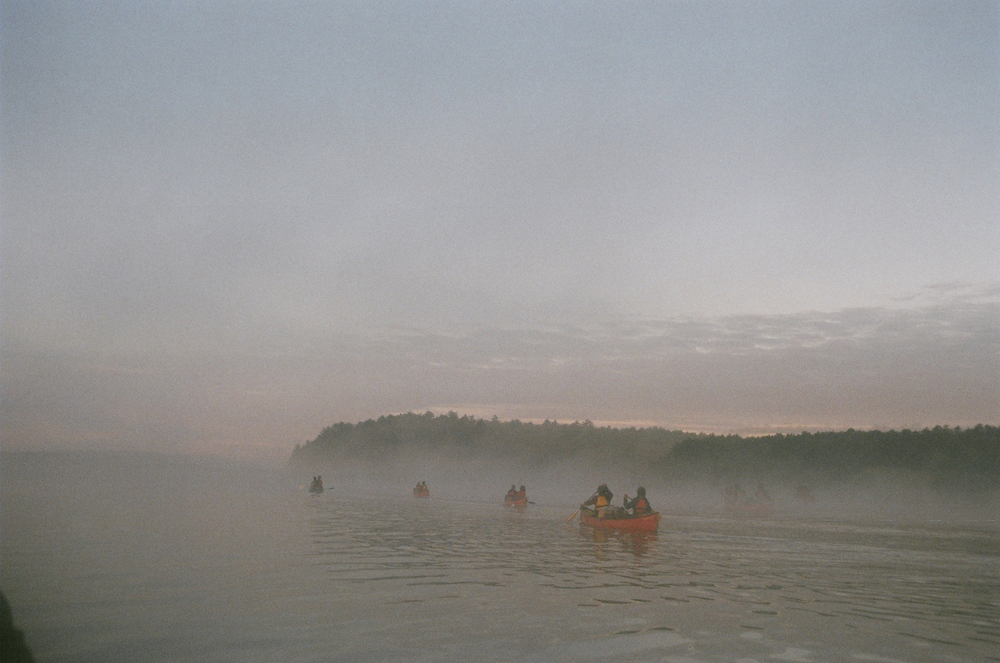
Photo credit: Russell & his film camera
We began to eat: munching on Rababu and delectable Fiddleheads collected by our forager, Russell. After a few minutes we noticed that, much to our dismay, the water level was rising, inching closer and closer to where we had set our tents. We had to reset our tents just on the grassy field up on the higher rise. Exhausted, we fell asleep, ready to continue on in the morning.
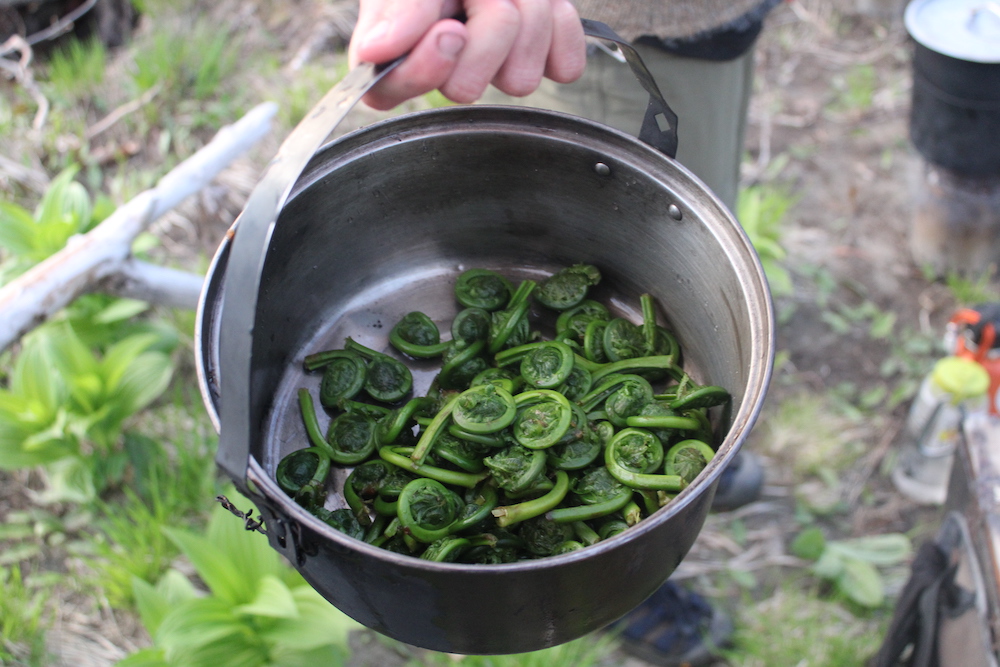 The next day was a very pleasant paddle along the Sandy, tranquil and beautiful, until we encountered our first rapid, an intimidating rushing surge of water right beneath a bridge under construction. Tensions were high and there were many who had never run a rapid before. One canoe at a time we went, and all safely made it through. But the excitement was not over! Near the end of our day, we all halted just before a large bridge.
The next day was a very pleasant paddle along the Sandy, tranquil and beautiful, until we encountered our first rapid, an intimidating rushing surge of water right beneath a bridge under construction. Tensions were high and there were many who had never run a rapid before. One canoe at a time we went, and all safely made it through. But the excitement was not over! Near the end of our day, we all halted just before a large bridge.
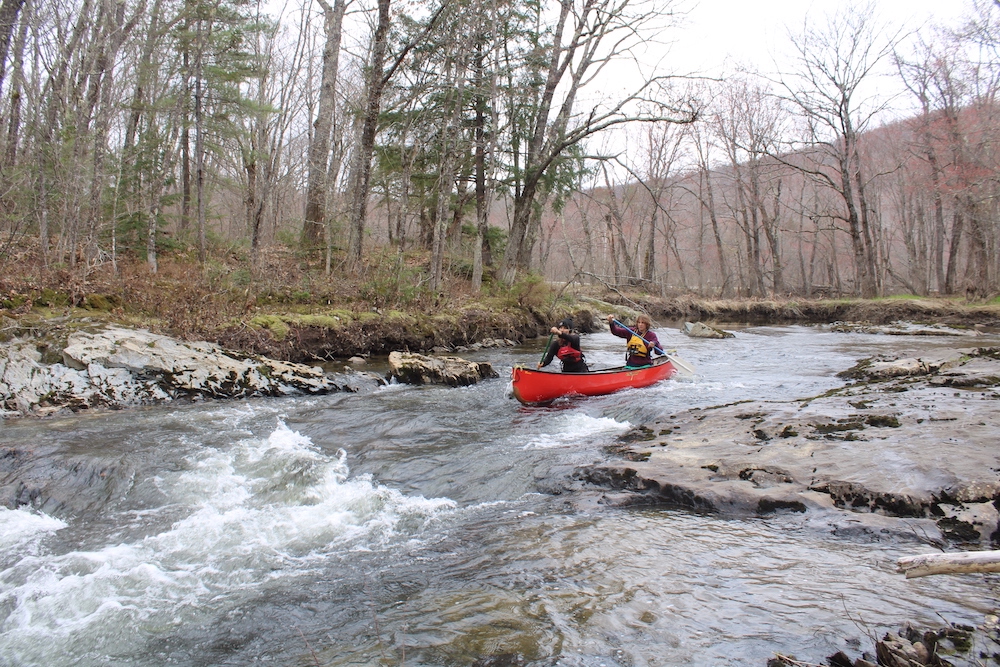 There to meet us was another rapid, even larger than the last. The instructors went first to scout, and we waited for what seemed like eons. Finally, they returned on foot to give us the information we needed, and one-by-one we went, pulling off onto a bank with an exceptionally steep slope. A kind man named Russel Dodge Jr., who owned the land right above the bank, said that we could stay in his field. So began a strenuous task of hauling all our gear up this sheer incline. Various paths were taken, many methods were used, and we successfully lugged all our gear into camp.
There to meet us was another rapid, even larger than the last. The instructors went first to scout, and we waited for what seemed like eons. Finally, they returned on foot to give us the information we needed, and one-by-one we went, pulling off onto a bank with an exceptionally steep slope. A kind man named Russel Dodge Jr., who owned the land right above the bank, said that we could stay in his field. So began a strenuous task of hauling all our gear up this sheer incline. Various paths were taken, many methods were used, and we successfully lugged all our gear into camp.
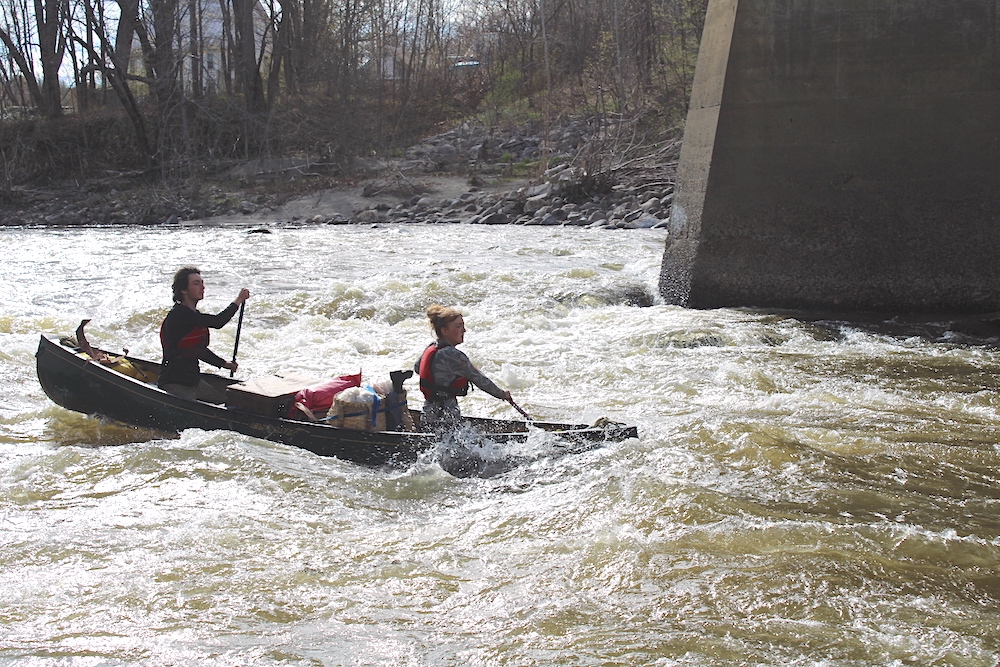 Russel owned the local foods store named Whitewater Farm Market, only a 3 minute walk or so from his property, where he sells pork, bison, beef, lamb, jams, syrups, etc, all locally sourced. We bought some breakfast and sweet Italian sausage, much to our delight. After we acquired our sausage we set off, going down more rapids, eventually arriving at a gorgeous green field owned by a very friendly couple named Steve and Marty Kitchen, who allowed us to get fresh water and forage their large quantities of wild ramp.
Russel owned the local foods store named Whitewater Farm Market, only a 3 minute walk or so from his property, where he sells pork, bison, beef, lamb, jams, syrups, etc, all locally sourced. We bought some breakfast and sweet Italian sausage, much to our delight. After we acquired our sausage we set off, going down more rapids, eventually arriving at a gorgeous green field owned by a very friendly couple named Steve and Marty Kitchen, who allowed us to get fresh water and forage their large quantities of wild ramp.
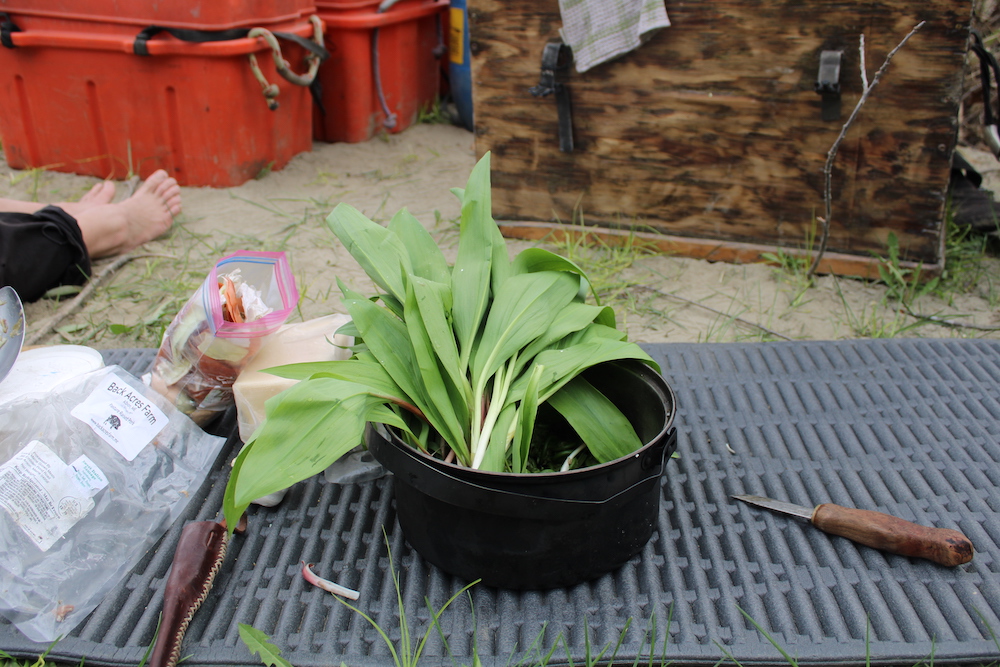 The next day, we finally reached the Kennebec River, amidst pouring rain. On those banks we met Albie Barden, a local historian who taught us about the Abenaki people and their long-standing relationship with the Kennebec itself. He led us to a small sanctuary called The Pines, which is the site of an old Norridgewock village that was massacred by the British Navy in the early 1600’s. He also told us about his efforts to preserve local, heritage corn varieties: growing corn on land that it had been growing on for thousands of years. He also happened to be neighbors with our hosts that night, Al and Patti Baldwin.
The next day, we finally reached the Kennebec River, amidst pouring rain. On those banks we met Albie Barden, a local historian who taught us about the Abenaki people and their long-standing relationship with the Kennebec itself. He led us to a small sanctuary called The Pines, which is the site of an old Norridgewock village that was massacred by the British Navy in the early 1600’s. He also told us about his efforts to preserve local, heritage corn varieties: growing corn on land that it had been growing on for thousands of years. He also happened to be neighbors with our hosts that night, Al and Patti Baldwin.
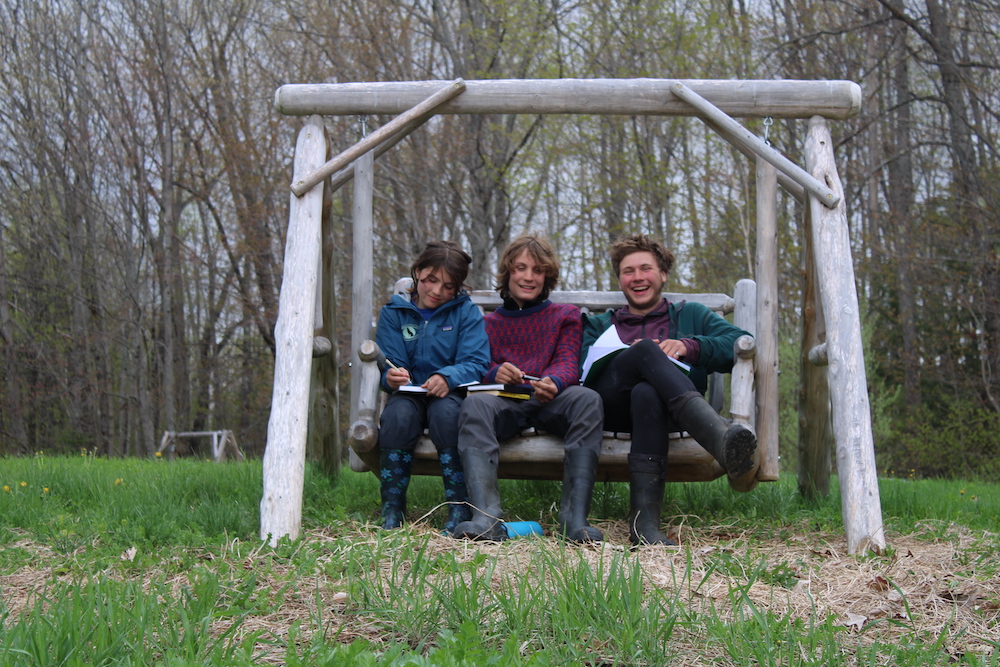
Miriam, Ben H and Ben S
Our paddle to our next destination, Skowhegan, was quite pleasant. The sun was beaming down its warmth, and the clouds had mostly departed from the day before.
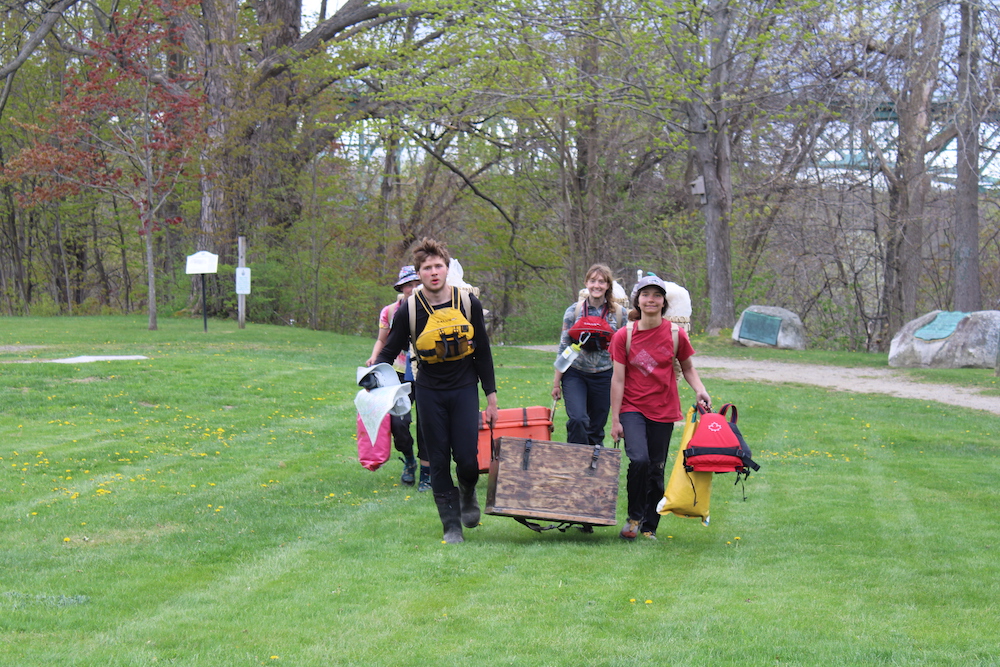
Ben S, Aria, Addie hauling gear many, many times
We were about to arrive at the Skowhegan dam when we met Sam and Patricia Horine, who were also in a canoe. They had coordinated most of our local backyard campsites up to that point, and kindly directed us to the most convenient spot to take out our boats for our portage. We unloaded our boats and began the first part of the portage, crossing a rickety wooden bridge that wobbled uncontrollably, jerking many of us off balance. We then crossed a busy street, walked through some back alleys, and reached a mostly paved trail that led to our put in.
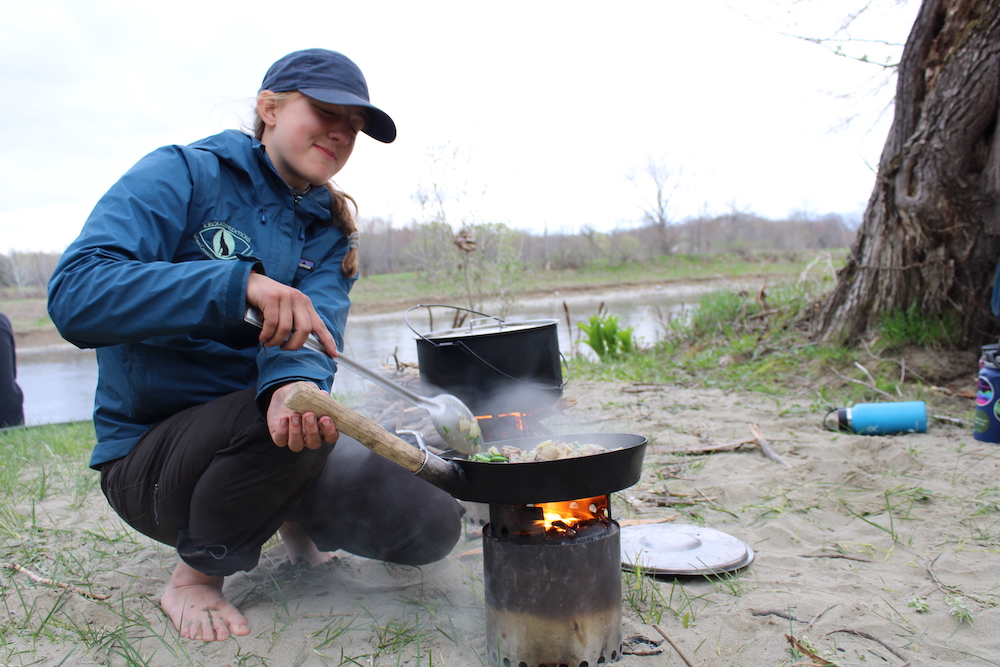
Aria cooking up fiddleheads for dinner
After all the boats were moved, we sat down and had lunch that our food managers had run a mile to and from Hannaford to get: PB&J sandwiches. We made the final gear haul to the put-in, took a short, bracing swim, then jumped in the boats to finish our day.
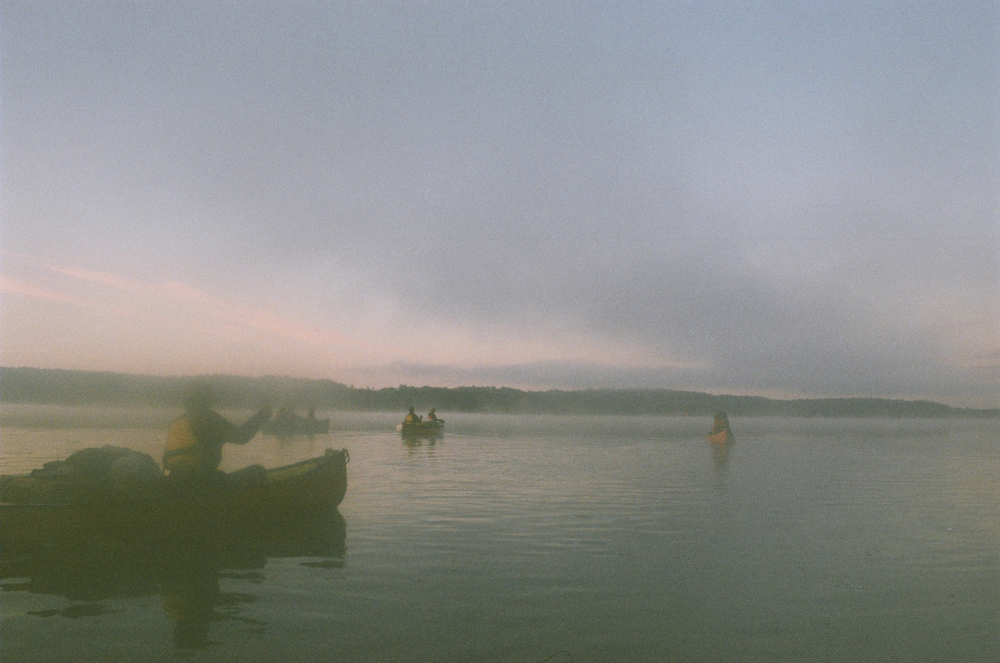
More of Russell’s photography!
These last few miles were beautiful, the golden light of late afternoon glinting off our paddles, painting the trees lining the water golden. Our strokes carried us to the backyard of Donna, where a set of mis-matched wooden docks extended out of a cove to meet us. It was a lovely place to spend our live-over, towering pines and cherries and willows, all the deciduous trees just beginning to leaf out. We are so thankful to Donna for letting us make our home there.
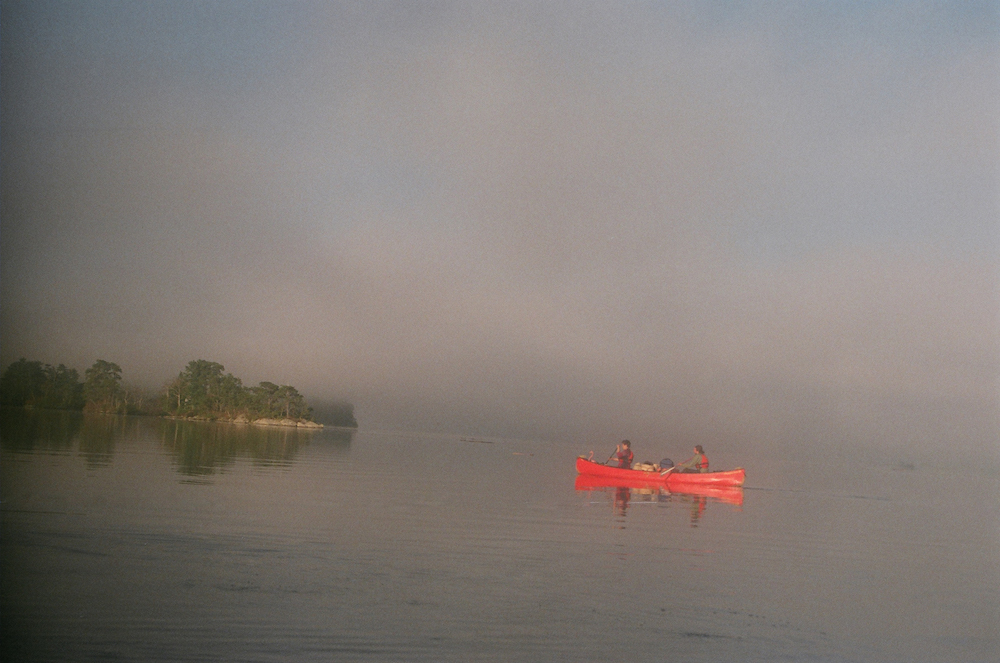
The golden hour paddle, captured on film
It was a gorgeous sunny morning when we left Donna’s house, but that quickly dissolved into a gauntlet of hammering rain, howling winds, and chilly temperatures. A scenario that you would expect to evoke feelings of hopelessness and despair, for the most part, did not. We felt quite the opposite. We weren’t down in the pits of misery; we were really enjoying ourselves, using our own power to propel us towards the oncoming waves, crashing into them and spraying frigid water onto our already cold hands.
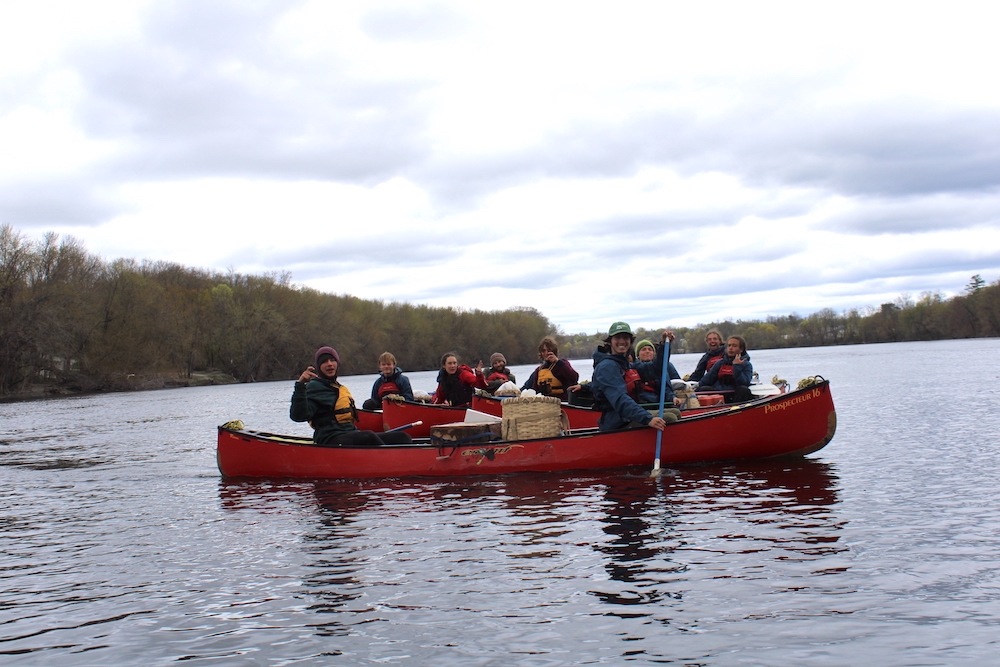 We were merrily singing all the way to shore, where we were to have another portage, which we soon found out was quite a miniscule distance. As we hopped out of our boats we began leaping into the air, hooting and hollering with joy. We pranced and skipped through a wet grassy field before carrying our boats and gear the short distance to our next put in.
We were merrily singing all the way to shore, where we were to have another portage, which we soon found out was quite a miniscule distance. As we hopped out of our boats we began leaping into the air, hooting and hollering with joy. We pranced and skipped through a wet grassy field before carrying our boats and gear the short distance to our next put in.
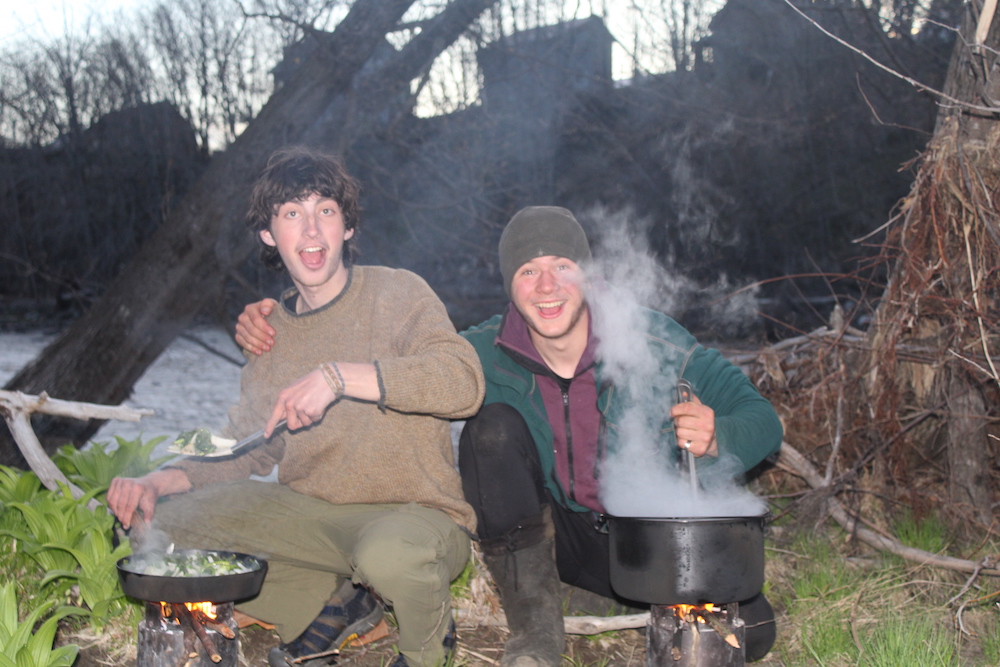 On May 8th, we reached our longest portage yet; carrying our canoes through downtown Waterville, by-passing not one, but two, large scale dams. It was a daunting task that was set before us. We began by asking for help! We met a kind lady Jeanine who happened to be the chair of the AMC Outings Club, who called her friend, Tom to ask him if he would let us load his truck with his gear, so all we would need to do was carry our canoes. The portage itself was still difficult.
On May 8th, we reached our longest portage yet; carrying our canoes through downtown Waterville, by-passing not one, but two, large scale dams. It was a daunting task that was set before us. We began by asking for help! We met a kind lady Jeanine who happened to be the chair of the AMC Outings Club, who called her friend, Tom to ask him if he would let us load his truck with his gear, so all we would need to do was carry our canoes. The portage itself was still difficult.
We carried the canoes about a mile, switching off when we needed to, then stopped and rested for a few minutes. We reached our final put-in with many cries of elation and relief. We loaded the boats in a park right below the historical sight of Fort Halifax. Returning from the beach, our noses and eyes told us our wonderful instructors had bought us pizza! Now we had crossed over the last of the dams on the Kennebec, and no more portages stood between us and the sea.
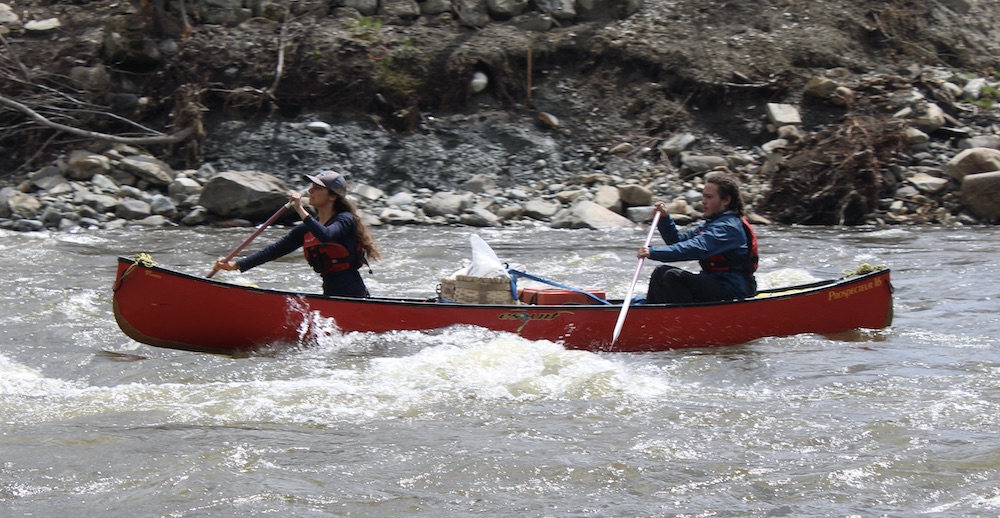
Aria and Arnett, navigating rapids
We discovered the day before we reached Augusta, Maine’s Capital, that we would be traveling sans instructors: a group solo. We woke up the day of with our instructors gone, leaving us to fend for ourselves in the wilderness of Andy Collars’ back yard. Our goal was to meet the instructors at 4-o’clock in the afternoon. We had 16 miles to Augusta, and only 5 hours to do it. We would be staying at Fort Western, a historical recreation of a pre-colonial fort, with the original building at its center. To our surprise, the cedar palisades of the fort came into view 2 hours early. We had flown! There we were greeted by our instructors, and Stan, one of the caretakers of the fort. We lived over again at Augusta, getting a tour of the fort in combination with a history lesson, as well as a surprise cannon firing. We also got the opportunity to explore the city and just relax.
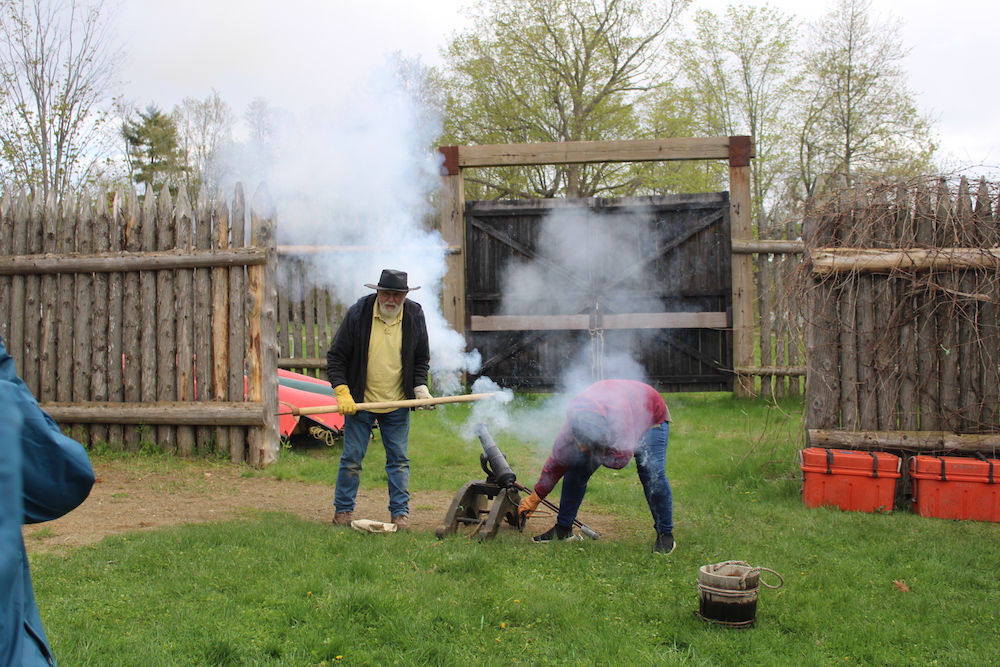 On the last night of our stay at FW, the instructors informed us that for our final two days of paddling we would be traveling independently. After a logistical debrief, we went to bed prepared for the big days ahead. We woke from our slumber and loaded our boats. Our travel to the next camp was smooth and incredibly fast, arriving at our destination, Swan Island, around noon. Setting up camp was quick and easy, allowing for a large swath of personal time to explore Swan Island and all of its natural beauty.
On the last night of our stay at FW, the instructors informed us that for our final two days of paddling we would be traveling independently. After a logistical debrief, we went to bed prepared for the big days ahead. We woke from our slumber and loaded our boats. Our travel to the next camp was smooth and incredibly fast, arriving at our destination, Swan Island, around noon. Setting up camp was quick and easy, allowing for a large swath of personal time to explore Swan Island and all of its natural beauty.
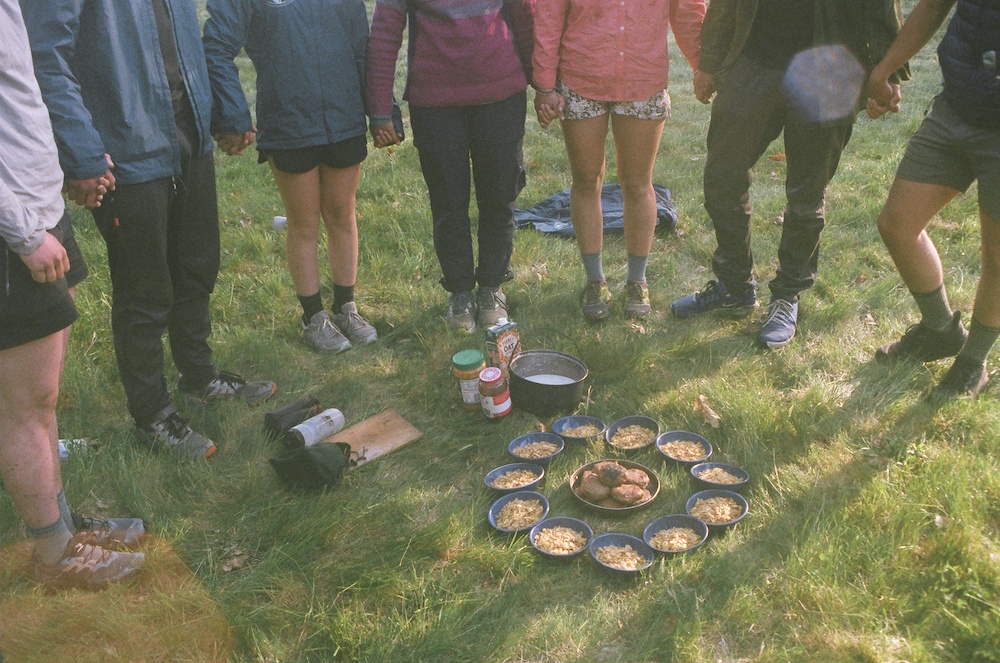 “I went out to explore the island, and have some much needed free time. I went West and found a big field near camp that led to a small dirt road. I followed it North until I found a little side trail to the West. I meandered my way through a white pine forest until I reached the opposite shore of the island. I found a small, grassy bank with a huge white pine right on the water. So I sat and wrote for a while. The birds were singing in the saplings next to me. I kept going on the trail, along the shore, I found a mossy bank under cedar, and red pine trees. I sat in the rain, then the sun.” – Una
“I went out to explore the island, and have some much needed free time. I went West and found a big field near camp that led to a small dirt road. I followed it North until I found a little side trail to the West. I meandered my way through a white pine forest until I reached the opposite shore of the island. I found a small, grassy bank with a huge white pine right on the water. So I sat and wrote for a while. The birds were singing in the saplings next to me. I kept going on the trail, along the shore, I found a mossy bank under cedar, and red pine trees. I sat in the rain, then the sun.” – Una
After our exploration, we ate dinner, planned the next morning and headed for bed at an early hour. We decided that we would awaken at 4AM to catch the proper tides. The morning was stunning, mist covered the river in a shroud and the sun’s early rays glinted across the water’s surface. We stopped at a small island for snack, home to many a goose, and encountered our first seal, surfacing its shiny muzzle from time to time. We approached Bath Iron Works, witnessing the ongoing creation of enormous ships of war.
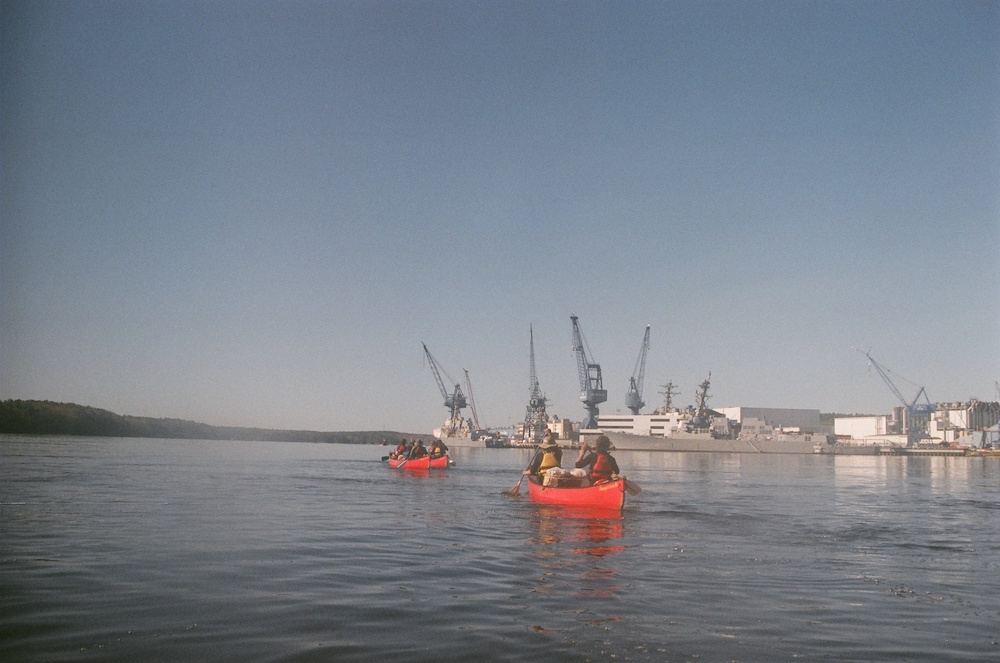
Approaching Bath Iron Works. Vessels. Photo: Russell
We docked our boats at the Maine Maritime Museum to await the changing of the tides. We had about three hours, which we chose to spend in the Patton Free Library, tucking ourselves away among the stacks for a much needed bit of quiet reading.
When the time came, we bid Bath farewell, canoeing into a strong headwind, doing one last carry over a small dam, then canoeing up a creek to find Nathan and Hanah waiting for us! Our last hours of paddling much resembled our first, making our way through a winding creek, heaving our canoes over floating grasses, and watching herons silently wing their way along the banks. Unloading our boats and portaging to the beautiful campground where we were going to layover was swift, and we immediately dove into preparations for our final leg: biking home!
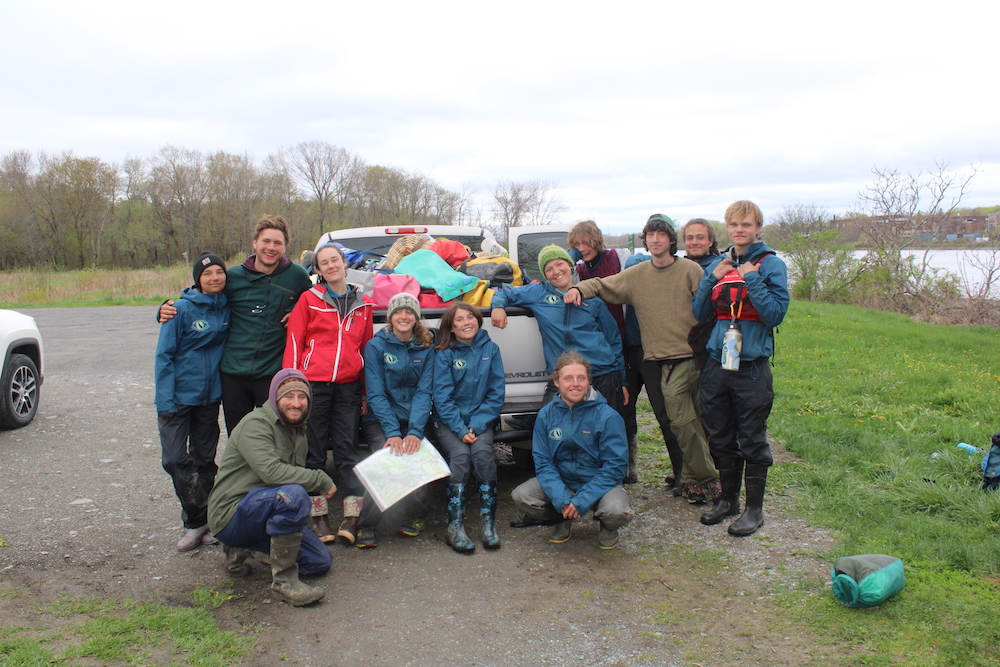
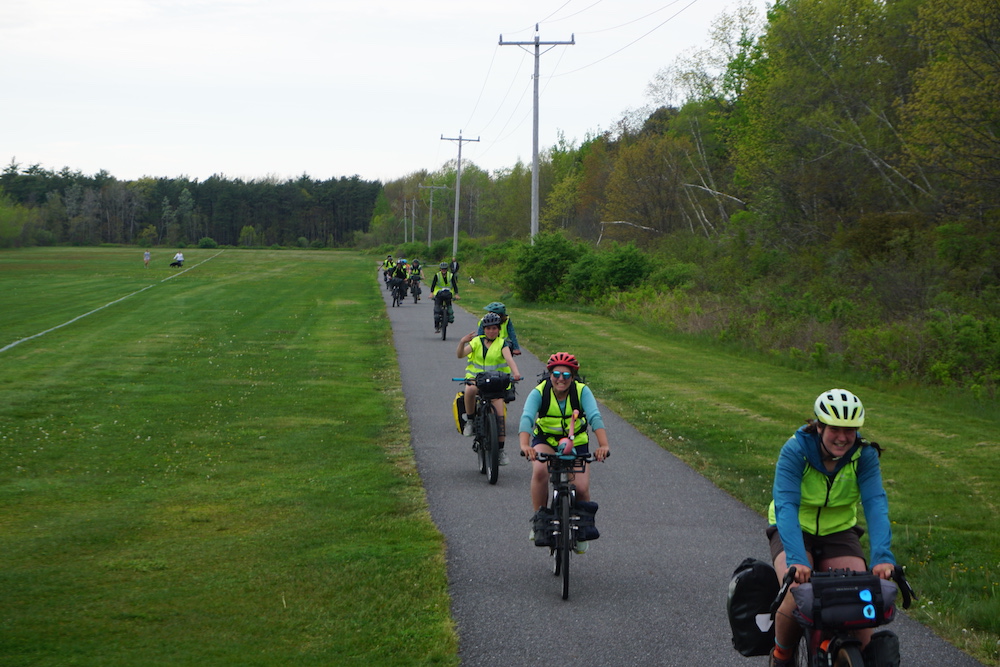
On a bike path, Una with Felipe the flamingo still going strong (and who completed their journey, from snowbank to Kroka)
Biking Leg went wheely quickly! We quickly adapted from paddling to peddling our loaded bikes, frame bags & front racks stuffed with all the gear we couldn’t leave behind.
We went as bare-bones as possible for this leg. Fewer clothes, less food, and no luxury items to be spoken of. Cutting down on weight and bulk was important, because of our limited space (we only had three sets of panniers, heroically carried by Miriam, Max and Rebecca).
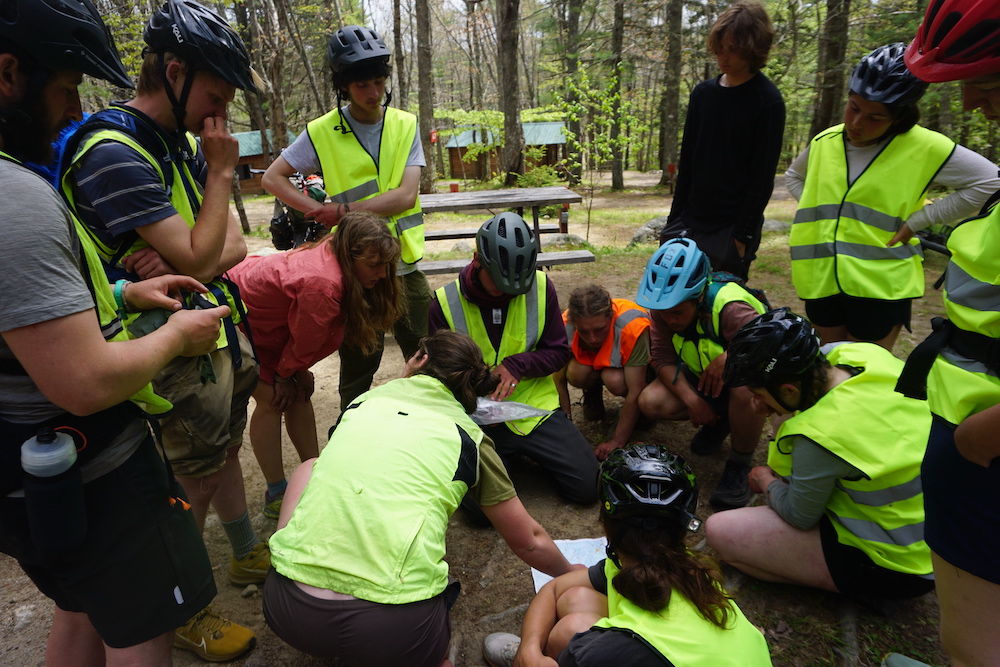 We had to heavily supplement our food supply with frequent stops at whatever Shaws or Hannafords we passed. It wasn’t hard to find them as we were often biking along roads. We followed a combination of biking paths & roads for the leg, taking part of the East Coast Greenway & rail trails, as well as back roads and main thoroughfares. More than ever we were toeing the line between camping and civilization, staying in backyards instead of the backwoods, riding on roads instead of rivers. This leg helped to ease our transition from solitude of the bush to the clamor of the modern world, all the while still keeping to the traditions and mindfulness we hold sacred.
We had to heavily supplement our food supply with frequent stops at whatever Shaws or Hannafords we passed. It wasn’t hard to find them as we were often biking along roads. We followed a combination of biking paths & roads for the leg, taking part of the East Coast Greenway & rail trails, as well as back roads and main thoroughfares. More than ever we were toeing the line between camping and civilization, staying in backyards instead of the backwoods, riding on roads instead of rivers. This leg helped to ease our transition from solitude of the bush to the clamor of the modern world, all the while still keeping to the traditions and mindfulness we hold sacred.
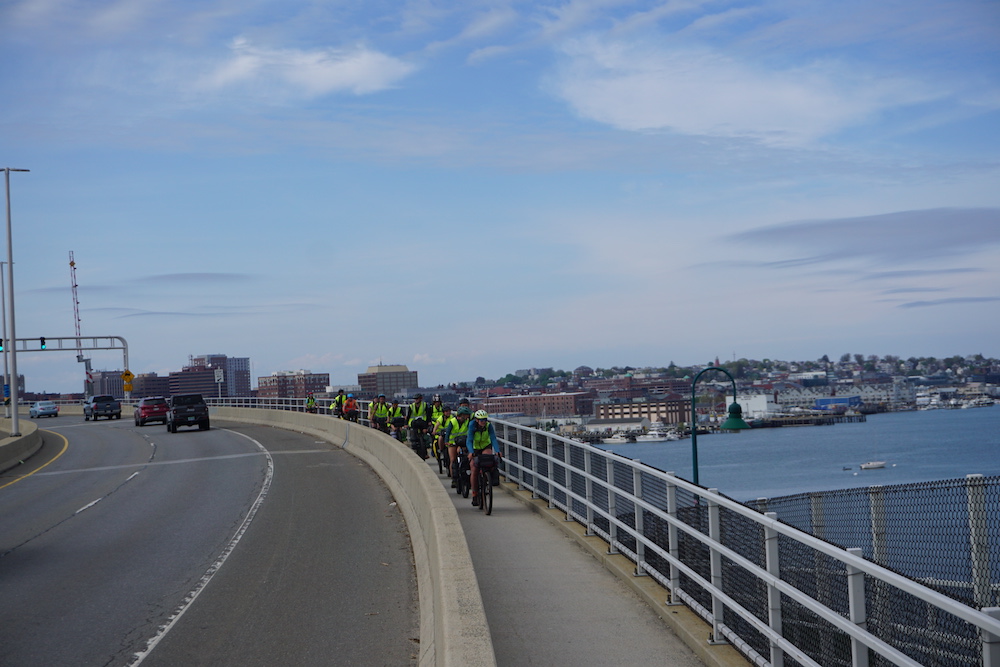 Our daily mileage just about doubled on bikes, jumping from an average of fifteen a day to around thirty. Home was approaching much faster then we could have expected after walking, skiing and paddling everywhere.
Our daily mileage just about doubled on bikes, jumping from an average of fifteen a day to around thirty. Home was approaching much faster then we could have expected after walking, skiing and paddling everywhere.
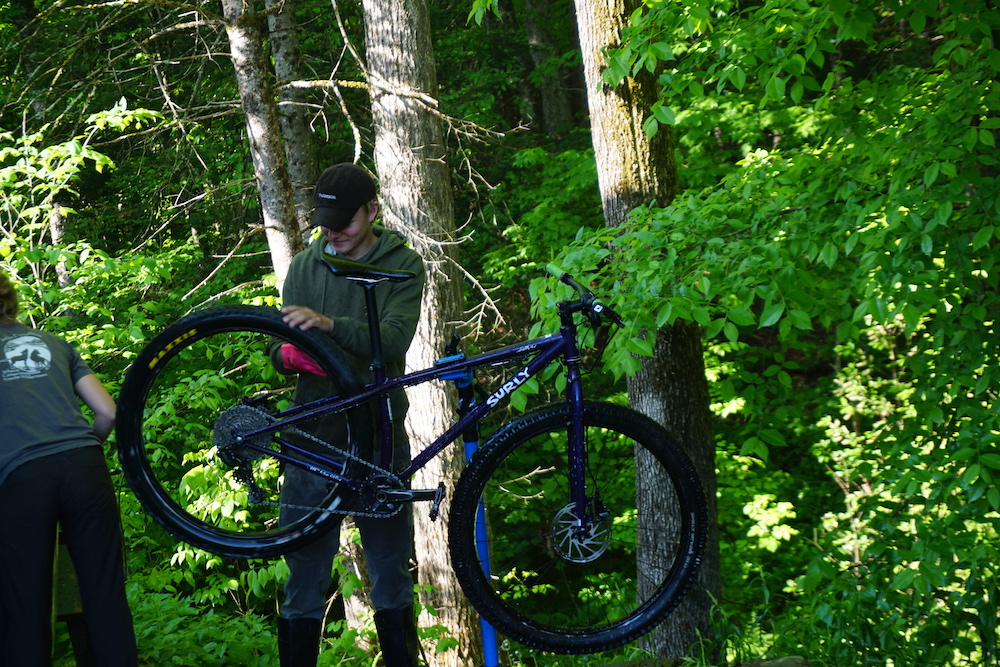 After a long day of biking we arrived at the house of our hosts for the night, who were named Dumptruck, Thresher (like the shark) and Toasty. These were not their real names but trail titles that were given to them from various wondrous through-hiking adventures. If you happen to meet them they might tell you their stories. They had two adorable fluffy cats, one was particularly mischievous and would attempt escapes from their home. They fed us a titanic dinner: eleven pounds of pasta, accompanied by a delicious red sauce! After a joyous night we plopped into our sleeping bags and went to sleep anticipating the next day where we would experience a few hours of independent travel on bikes.
After a long day of biking we arrived at the house of our hosts for the night, who were named Dumptruck, Thresher (like the shark) and Toasty. These were not their real names but trail titles that were given to them from various wondrous through-hiking adventures. If you happen to meet them they might tell you their stories. They had two adorable fluffy cats, one was particularly mischievous and would attempt escapes from their home. They fed us a titanic dinner: eleven pounds of pasta, accompanied by a delicious red sauce! After a joyous night we plopped into our sleeping bags and went to sleep anticipating the next day where we would experience a few hours of independent travel on bikes.
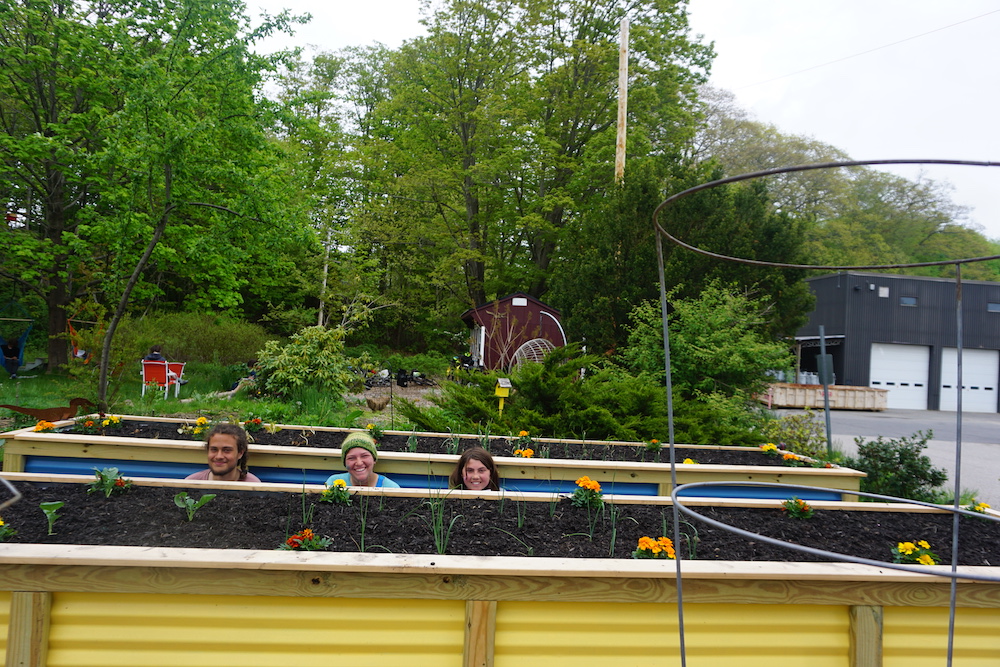 We camped with another illustrious host the next day: Brent Bell, professor of Outdoor Leadership at UNH. We got to the college early enough to bike around & explore, much to the delight of two of our number who would be attending it in the coming years: Ben H and Sam, one of our instructors! We even managed to forage half a sandwich from a bench on campus. We were welcomed to Brent’s backyard, where he told us about his work and promised us rides in his pedicab. During camp takedown the next morning, some of us got to ride around the neighborhood towed by Brent & his bicycle, music playing in the background. It would have been lovely to stay and get more rides, but we had to get “Butts on Bikes” and head on.
We camped with another illustrious host the next day: Brent Bell, professor of Outdoor Leadership at UNH. We got to the college early enough to bike around & explore, much to the delight of two of our number who would be attending it in the coming years: Ben H and Sam, one of our instructors! We even managed to forage half a sandwich from a bench on campus. We were welcomed to Brent’s backyard, where he told us about his work and promised us rides in his pedicab. During camp takedown the next morning, some of us got to ride around the neighborhood towed by Brent & his bicycle, music playing in the background. It would have been lovely to stay and get more rides, but we had to get “Butts on Bikes” and head on.
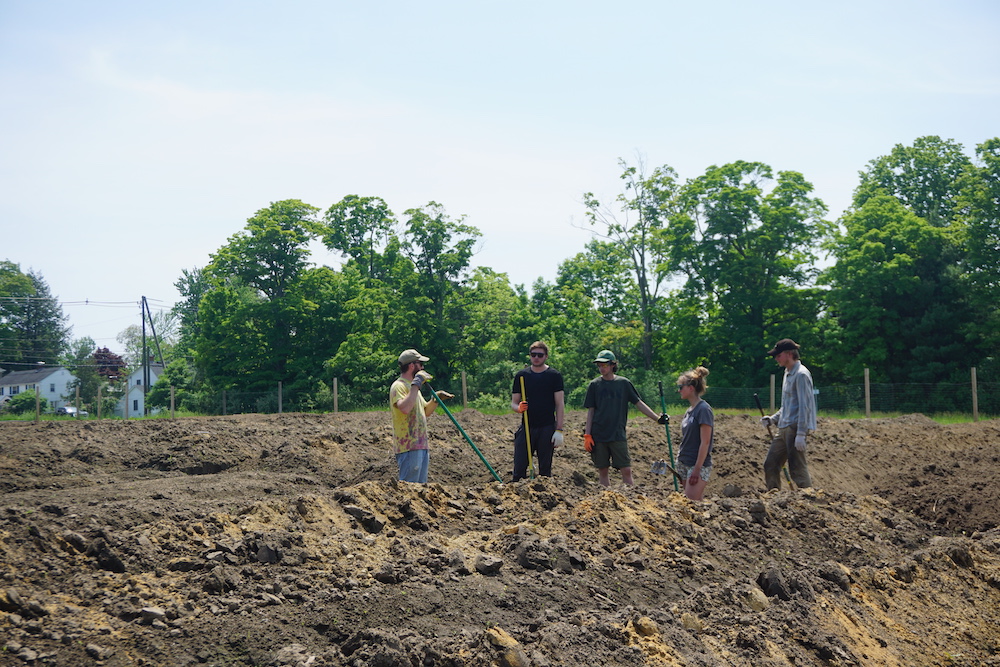 Our next stop was Calef Lake campground, where we would live over the next day for some well-earned respite. We were told the plan for the “rest day” was that we would bike into Manchester, which was about twelve to fifteen miles away from the campground to do some service work at a farm that supplies food banks. We briefly jumped into the pond, had a delectable dinner and an early bedtime. In the morning we worked for around three hours at the farm, flattening out the beds, and weeding. The sun was scorching hot, draining our energy. Miriam, one of our food managers, along with Rebecca brought us a much-appreciated treat of ice-cold popsicles!
Our next stop was Calef Lake campground, where we would live over the next day for some well-earned respite. We were told the plan for the “rest day” was that we would bike into Manchester, which was about twelve to fifteen miles away from the campground to do some service work at a farm that supplies food banks. We briefly jumped into the pond, had a delectable dinner and an early bedtime. In the morning we worked for around three hours at the farm, flattening out the beds, and weeding. The sun was scorching hot, draining our energy. Miriam, one of our food managers, along with Rebecca brought us a much-appreciated treat of ice-cold popsicles!
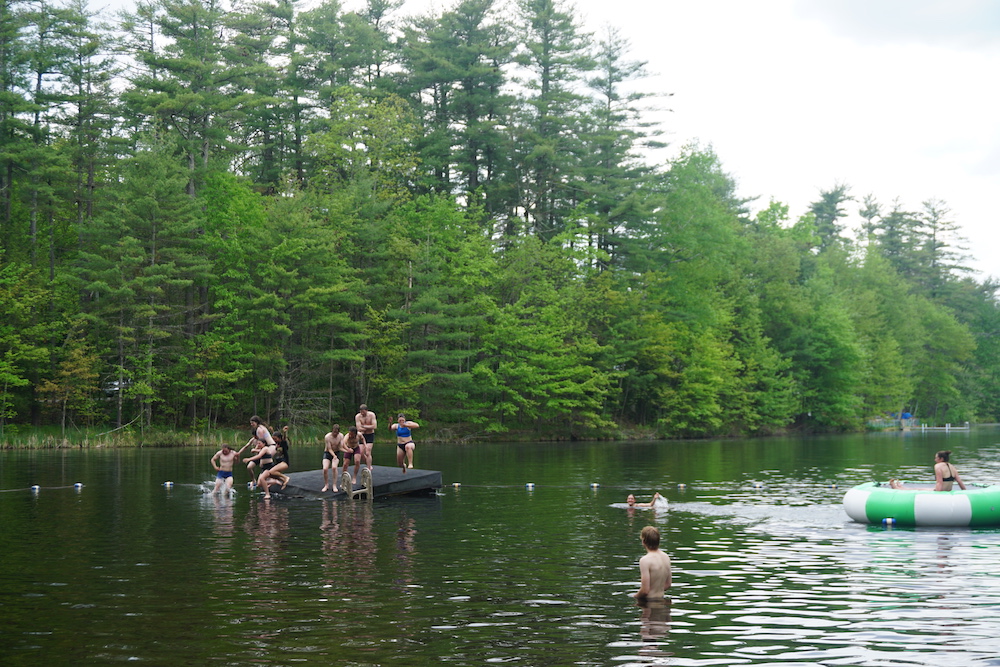 We returned to camp quite exhausted, and ready for a relaxed dinner. During journaling the sky was becoming grayer and loud echoing booms could be heard, heralding an oncoming storm. Suddenly we were caught in a torrential downpour, the rain so powerful and fast that one of our tents floors was flooded in mere minutes, submerging our belongings kept inside. We scrambled to quickly extract our items from the puddle that had accumulated. We wrapped our stuff in tarps and moved the tents to a more elevated location. The rain eventually subsided but some sleeping bags had gotten wet and a few of us had to make due without as a result.
We returned to camp quite exhausted, and ready for a relaxed dinner. During journaling the sky was becoming grayer and loud echoing booms could be heard, heralding an oncoming storm. Suddenly we were caught in a torrential downpour, the rain so powerful and fast that one of our tents floors was flooded in mere minutes, submerging our belongings kept inside. We scrambled to quickly extract our items from the puddle that had accumulated. We wrapped our stuff in tarps and moved the tents to a more elevated location. The rain eventually subsided but some sleeping bags had gotten wet and a few of us had to make due without as a result.
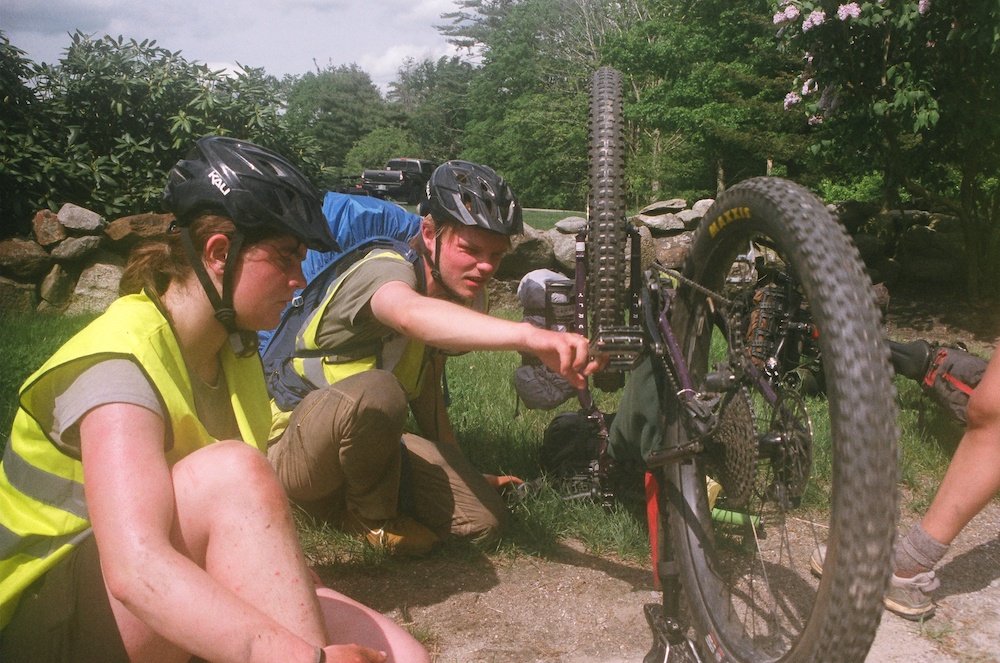
Lily and Thomas, Gear Managers, making bike repairs
To our relief, we were told that the next day would be another live over, since the first one did not seem sufficient in terms of actual rest. So we did a lot of swimming, playing games, academics and had personal time to decompress.
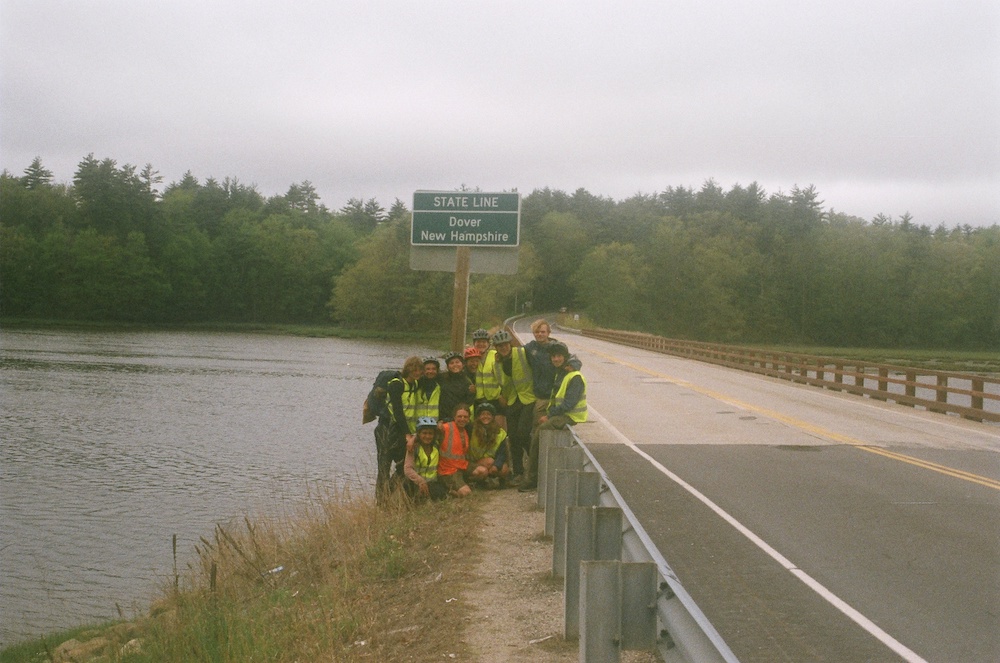 We left Calef Lake to begin our last two days of biking leg. Bidding our instructors goodbye in Manchester, we faced towering hills and extreme heat during our last 77 miles of independent travel. For our final challenge, we were left two canoes to ferry eleven people and their bikes across Ashuelot Pond.
We left Calef Lake to begin our last two days of biking leg. Bidding our instructors goodbye in Manchester, we faced towering hills and extreme heat during our last 77 miles of independent travel. For our final challenge, we were left two canoes to ferry eleven people and their bikes across Ashuelot Pond.
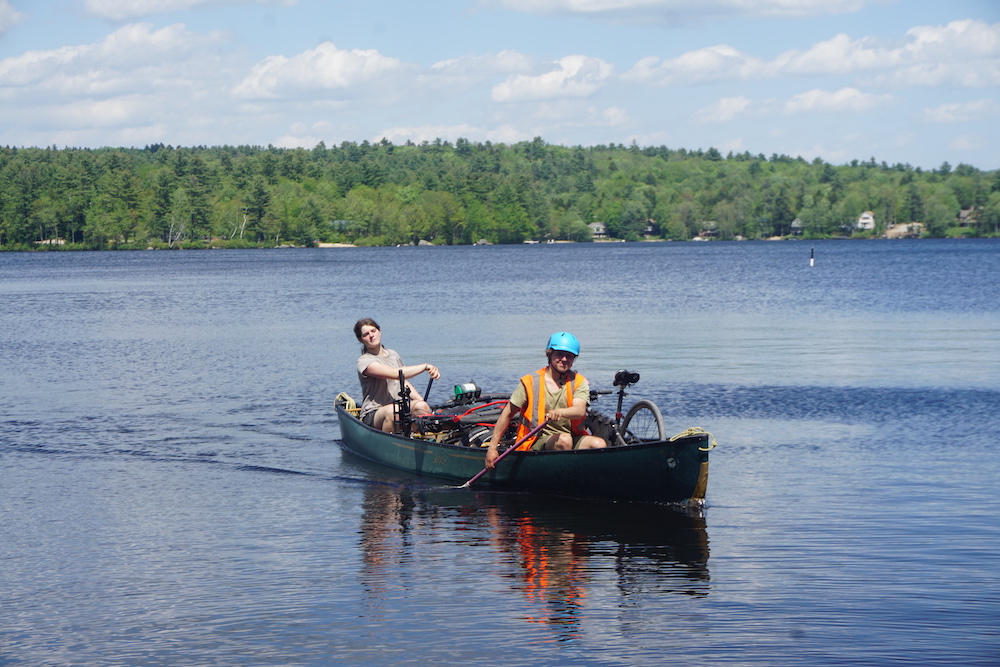
Crossing Ashuelot Pond
It was almost surreal cresting the hill to Kroka, seeing it in full bloom and hearing Nathan blasting Star Wars. We were greeted by a lovely circle of friends old and new with cookies and lemonade made by Jennifer!
Our final short days of semester were spent at Basecamp, working on projects, going on outings and enjoying each other’s company. This semester has been such a gift to all of us; our eternal gratitude goes out to anyone who supported or participated in it. Semester is an experience that has shaped us and the way we each view the world. We are excited to continue growing and learning once we leave. It is time for us to go out into the world, tell our stories and hear stories from other people.
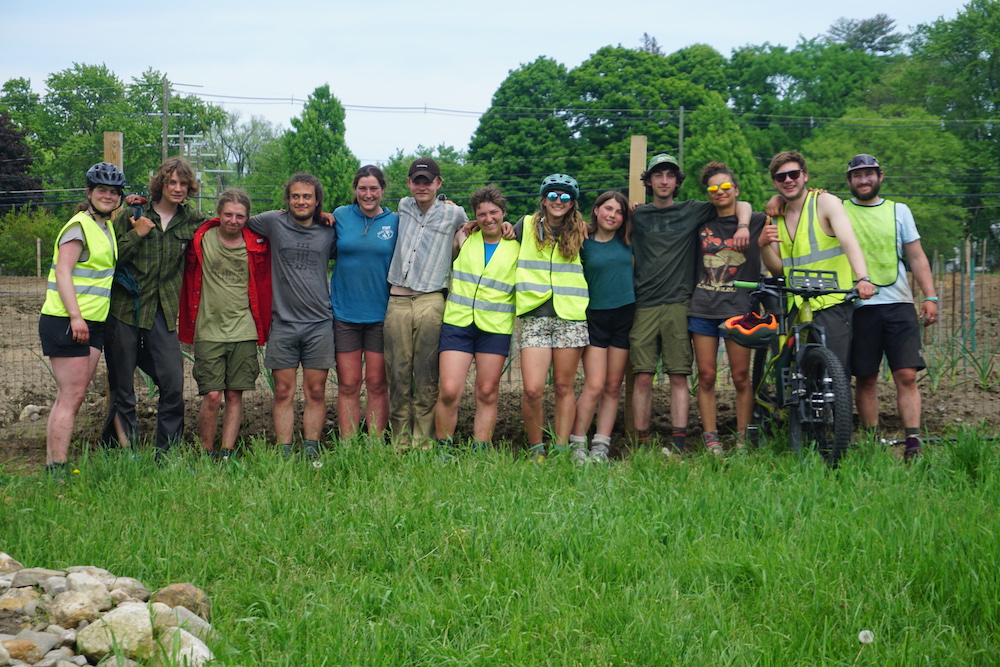
We hope you enjoyed the blog! It’s been an honor to be a few of the voices of Semester.
Your scribes,
Arnett & Max

